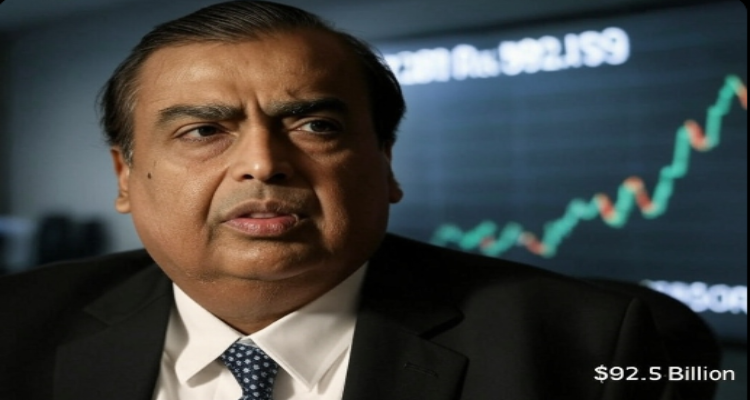Reliance Shares Slide: \$7B Loss Hits Ambani’s Fortune

Reliance Industries lost \$7 billion in market value, dropping Mukesh Ambani’s net worth to \$92.5 billion amid a turbulent week.
Reliance’s \$7 Billion Market Dip Sends Ripples Through Ambani’s Fortune
In a striking reminder of how swiftly market tides can turn, Reliance Industries Ltd.—India’s most valuable conglomerate—shed nearly ₹59,800 crore (approximately \$7 billion) in market capitalization last week. The sharp decline in share prices not only rattled investor confidence but also carved a sizable dent in the net worth of its chairman, Mukesh Ambani.
Shares of the energy-to-retail giant closed at ₹1,377.75 on Friday, May 9, marking a 1.93% drop from the previous day and a 3.67% dip for the week. This slide left Reliance’s market value at ₹18.64 lakh crore, far below its July 2024 high when shares traded at ₹1,608.95.
Market Volatility Hits Even the Titans
The broader BSE Sensex mirrored this decline, falling 1.10% over the week. But Reliance’s outsized presence in India’s corporate ecosystem made its losses more pronounced. As the cornerstone of several indexes, Reliance’s slump sent ripples across portfolios and institutional holdings alike.
For Ambani, Asia’s richest individual and the 13th wealthiest globally according to ‘Forbes’, the drop translated into a personal loss of billions. His net worth now stands at \$92.5 billion—a figure that, while still vast, is notably down from earlier peaks.
A Wider Market Correction
Reliance wasn’t alone in its stumble. Eight of India’s top ten most valued companies collectively lost over ₹1.6 lakh crore in market capitalization last week. Prominent names like HDFC Bank, Tata Consultancy Services (TCS), ICICI Bank, and Bharti Airtel also saw sharp declines. However, not all was bleak: Infosys and Hindustan Unilever defied the trend, managing modest gains amid the broader sell-off.
This correction signals rising investor anxiety, influenced by global economic headwinds, inflation fears, and shifting interest rate expectations. Analysts point to foreign institutional outflows and cautious domestic sentiment as key drivers behind the retreat.
Reliance’s Diverse Empire Faces Pressure
Reliance Industries has long been celebrated for its diversification—a buffer against market shocks. Its interests span oil refining, petrochemicals, telecommunications (via Jio), and retail (through Reliance Retail Ventures). But even this broad portfolio hasn’t insulated it from current market turbulence.
Investors are scrutinizing performance across its verticals. Jio Platforms, once the crown jewel for digital growth, is contending with intense competition and slower-than-expected monetization. Meanwhile, energy markets remain volatile, and retail expansion faces margin pressures.
“Reliance’s fundamentals remain strong, but the current environment demands caution,” said Anuj Mehta, a Mumbai-based equity analyst. “Institutional investors are rotating out of large-cap stocks, and Reliance is among the most exposed due to its weightage.”
The Long-Term View: Strategy Over Sentiment
Despite the recent pullback, market experts still view Reliance as a long-term bet. Its strategic bets on green energy, 5G infrastructure, and digital commerce are considered forward-thinking. The company’s \$10 billion commitment to renewable energy, along with plans for giga factories in Gujarat, positions it well in the evolving energy landscape.
Moreover, Ambani’s succession roadmap—transitioning leadership roles to his children across Reliance’s verticals—is seen as a stabilizing factor for governance and long-term vision.
Yet, analysts caution against complacency. The near-term picture remains uncertain, and volatility is likely to persist amid ongoing global and domestic macroeconomic shifts.
Investor Takeaway: Eyes on the Horizon
The recent market drop is a stark illustration that even corporate giants aren’t immune to volatility. For investors, it’s a call to re-evaluate risk, diversify holdings, and stay informed on macroeconomic signals. While Reliance’s foundations are robust, navigating the next chapter will require more than resilience—it will demand innovation and agility.
Disclaimer
This article is intended for informational purposes only. It does not constitute financial advice. Readers should consult with a professional financial advisor before making any investment decisions.
source : Times Now










